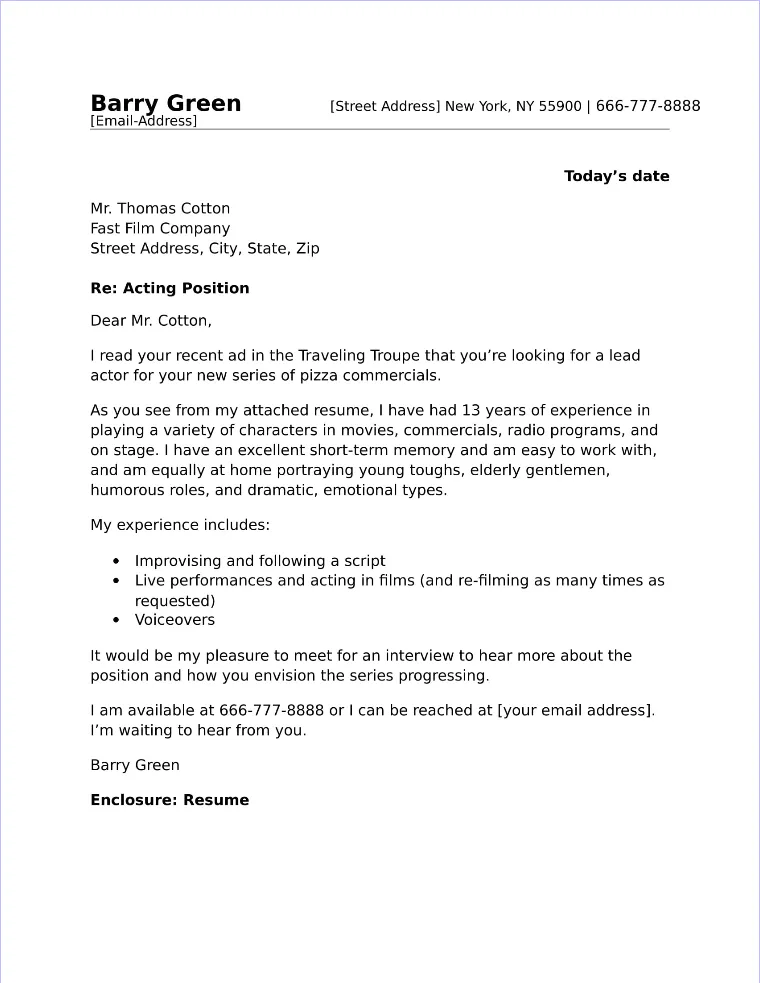What is an Acting Cover Letter
An acting cover letter is a crucial document that accompanies your acting resume when applying for roles in theater, film, television, and commercials. It serves as your introduction to casting directors, agents, and producers, providing them with a glimpse into your personality, skills, and suitability for a specific project. It’s more than just a formality it is your chance to make a strong first impression and distinguish yourself from other applicants. A well-crafted cover letter can significantly increase your chances of securing an audition or being considered for a role, while a poorly written one can lead to your application being overlooked. This guide will help you navigate the process of creating an acting cover letter that will impress any casting director and help you get the role you are dreaming of. The right words can open doors, and the acting cover letter is the key.
The Purpose of an Acting Cover Letter
The primary purpose of an acting cover letter is to sell yourself as an actor to the casting team. It complements your resume by providing context, expressing your passion, and demonstrating your understanding of the role and project. It allows you to personalize your application and showcase your unique qualities that may not be readily apparent from your resume alone. By highlighting relevant experience, skills, and personality traits, you can make a compelling case for why you are the perfect fit for the role. The cover letter also gives you the opportunity to express your enthusiasm for the project, demonstrating your dedication and commitment. It’s your chance to show the casting director you are more than just a list of credits; you are a passionate, professional actor ready to bring the character to life. Consider it your first audition on paper and show them why you are the best choice.
Key Components of a Compelling Acting Cover Letter

A compelling acting cover letter must include several key components to effectively showcase your abilities and qualifications. Firstly, you need a clear and concise introduction that immediately grabs the reader’s attention. State the role you’re applying for and where you found the listing. Next, highlight your relevant experience and skills, focusing on those that align with the specific requirements of the role. Provide specific examples and quantify your achievements whenever possible. Demonstrate your understanding of the project by mentioning why you are interested in it. Express your enthusiasm for the role and your commitment to bringing the character to life. Finally, include a call to action, inviting the reader to review your resume and contact you for an audition or further information. Remember to keep it brief, engaging, and tailored to each specific application. Always proofread your letter to avoid any errors that could detract from your professionalism. This is the most important step for a successful cover letter.
Your Contact Information and Salutation
Start your acting cover letter by providing your contact information, including your name, phone number, and email address. This information should be clearly displayed at the top of the letter. Following this, address the recipient with a professional salutation. If you know the casting director’s name, use it to personalize the letter, such as Dear Mr/Ms. [Last Name]. If you do not know the name, you can use a general salutation, such as Dear Casting Director, or To Whom It May Concern. Avoid using generic salutations like Dear Sir or Madam. Make sure your email address is professional and appropriate. The goal is to make a positive and professional first impression, so ensure the contact information is easy to find and the salutation is respectful and relevant to the specific casting call. Never underestimate the power of these small details.
Highlighting Your Skills and Experience
The body of your acting cover letter is the place to highlight your relevant skills and experience. Focus on the achievements and qualifications that align with the specific requirements of the role. Review the project’s description and emphasize the skills and experience the casting team is looking for. Provide concise examples of your past performances to demonstrate your abilities. Use action verbs to describe your accomplishments and quantify your achievements whenever possible. For example, instead of saying, “I played a leading role,” you could say, “I played the leading role in [Name of Play], where I delivered a captivating performance that received positive reviews.” Consider including any special skills, such as accents, stage combat, or musical talents that could be beneficial for the role. Tailor your information to the needs of the role and explain why your skills and experience make you the perfect candidate. Remember to maintain a positive and confident tone throughout.
Tailoring Your Letter to the Role

One of the most important aspects of a successful acting cover letter is tailoring it to each specific role. Do not use a generic cover letter for every application; take the time to customize it to each opportunity. Thoroughly review the project description and casting call to understand the character, the story, and the director’s vision. Research the production company, the writer, and the director to demonstrate your genuine interest in the project. Highlight your skills and experience that specifically align with the role’s requirements. Demonstrate your understanding of the character’s personality, motivations, and relationships. Explain how you envision yourself bringing the character to life and how you can contribute to the success of the production. By tailoring your letter, you demonstrate your attention to detail, your passion, and your genuine interest in the role, increasing your chances of making a positive impression on the casting team. This is the best way to stand out from the crowd.
Showcasing Your Personality and Enthusiasm
An effective acting cover letter should not only highlight your skills and experience but also showcase your personality and enthusiasm for acting. Let your passion shine through your words. Share your excitement for the role and the project. Demonstrate your commitment to bringing the character to life. Inject a touch of your unique personality into the letter to make it memorable. Use vivid language and storytelling techniques to engage the reader. Show that you’re not just applying for a job, but that you are an actor who is genuinely passionate about the craft. Express your willingness to collaborate and contribute to a positive working environment. However, maintain professionalism. Avoid excessive flattery or overly familiar language. Strike a balance between professionalism and personality to make your letter stand out from the competition. Remember, casting directors want to work with actors who are not only talented but also enthusiastic and enjoyable to be around.
Formatting Your Acting Cover Letter
The format of your acting cover letter is just as important as its content. A well-formatted letter is easy to read and makes a positive impression. Use a professional font, such as Times New Roman or Arial, in a size between 11 and 12 points. Maintain a consistent format throughout the letter. Use single spacing between lines and double spacing between paragraphs. Keep the letter concise and to the point, ideally within one page. Use clear and concise language and avoid jargon. Break up long blocks of text with bullet points or short paragraphs to improve readability. Ensure that the letter is free of grammatical errors and typos. Proofread your letter carefully before submitting it. Consider using a template to ensure consistency in your formatting. A clean and well-formatted letter shows that you are organized and professional. Take the time to create a polished and easy-to-read letter, and it will enhance the impact of your content and increase your chances of a positive response. This shows professionalism.
Proofreading and Editing Your Letter

Proofreading and editing are crucial steps in writing an effective acting cover letter. Errors can undermine your credibility and make a negative impression on the casting team. After you finish writing, carefully proofread your letter for any grammatical errors, typos, or punctuation mistakes. Pay close attention to the details, such as the correct spelling of names and the accuracy of dates and titles. Read the letter aloud to catch any awkward phrasing or sentences that don’t flow well. Consider having a friend, colleague, or mentor review your letter for feedback. They may be able to catch errors that you missed. Make sure the letter is consistent, clear, and well-written. A polished and error-free letter shows your professionalism and attention to detail. Investing time in proofreading and editing can make a significant difference in how your letter is perceived and can greatly enhance your chances of success. Take your time and make sure everything is perfect.
Acting Cover Letter Sample to Follow
Below is a sample acting cover letter that you can use as a guide when writing your own. Remember to customize this sample to fit your specific experience and the role you are applying for. [Your Name] [Your Address] [Your Phone Number] [Your Email Address] [Date] [Casting Director’s Name (if known)] [Casting Director’s Title] [Production Company Name] [Production Company Address] Dear [Casting Director’s Name or Casting Director], I am writing to express my interest in the role of [Character Name] in your upcoming production of [Project Name]. I was thrilled to learn about this project, and after reading the script, I am confident that my experience and passion for acting make me an ideal candidate for the role. In my previous role as [Previous Role], I demonstrated my ability to [Skills & Experience relevant to the role]. I have a strong understanding of character development and a proven ability to bring characters to life. I am also skilled in [Special Skills that may apply]. I am eager to bring my enthusiasm, skills, and dedication to this project. Thank you for your time and consideration. I look forward to the opportunity to audition for the role. Sincerely, [Your Signature] [Your Typed Name]. Using this example can help you craft the perfect acting cover letter to get you the job.
